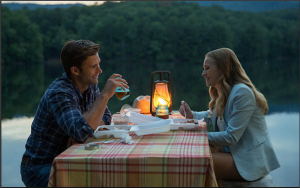METRO CANADA: Nicholas Sparks, cashing in on our lust for love
 By Richard Crouse – Metro In Focus
By Richard Crouse – Metro In Focus
Novelist Nicholas Sparks is the current king of romance writers. His flowery prose even gives Harlequin a run for their money in the three-hanky tearjerker department. Who else could write a line like, “Love is like the wind, you can’t see it but you can feel it,” with a straight face?
He is to romance writing what Buckley’s cough syrup is to a tickly throat. They both get the job done, but leave a sickly sweet aftertaste.
His best-known novel adaptation is The Notebook, a cross-generational love story that spent over a year as a New York Times hardcover top seller. Inspired by the story of his wife’s grandparent’s sixty-year marriage, the novel became a 2004 movie starring Ryan Gosling and Rachel McAdams. The tale of love and Alzheimer’s is emotionally manipulative—writer Gary Panton called this passionate weepie “mushier than a mushed-up bowl of mushy peas that’s just been mushed in an industrial-strength mushifier”—but opening weekend it surfed a wave of tears to the box office top five.
Sparks, a former pharmaceutical salesman writes tales of love and loss, of mighty obstacles overcome and lip-locks galore, which he defines as “dramatic epic love stories” along the lines of “Eric Segal’s Love Story or The Bridges of Madison County… But you can even go all the way back. You had Hemingway write A Farewell to Arms, the movies of the forties—Casablanca, From Here to Eternity—Shakespeare, and that’s the genre I work in.”
He caught some flack for comparing himself to Shakespeare—one writer said, “If Sparks is like Shakespeare, then a housepainter is like Picasso.”—but the fact remains that his unconventional love stories, his parcels of passion, have made his name synonymous with the romance genre.
This weekend prepare for another flurry of Sparkisms—tearstained romantic letters, lines like, “Love requires sacrifice but it’s worth it,” and passionate make-out sessions—as The Longest Ride hits the big screen.
This time around “Two stories separated by time, connected by fate,” get Sparksified as the lives of a young couple, played by Scott “Clint’s son” Eastwood and Britt Robertson and older love birds Alan Alda and Oona Chaplin, interlace. “I wish I could tell you it’s all happily ever after,” says Alda’s character, “not everybody gets that.”
Expect unexpected poignancy.
Critics haven’t always warmed to Sparks’s stories on film—Safe Haven with Julianne Hough as “a young woman’s struggle to love again” has a paltry 12% approval rating on Rotten Tomatoes while The Best of Me starring Michelle Monaghan and James Marsden as high school sweethearts reunited after two decades sits at a miserable 8% rating—but audiences can’t seem to get enough of his weepy tales of unrequited love, lost love, mature love and love in a time of trouble. Ten of his books have already been adapted for the movies, with one more, The Choice, scheduled for 2016.
His style of romance has caught on, but don’t call him a romance writer. “I write dramatic fiction. If you go into a further subgenre, it would be a love story, but it has its roots in the Greek tragedies. This genre evolved through Shakespeare. He did Romeo and Juliet. Hemingway did A Farewell to Arms. I do this currently today.”
